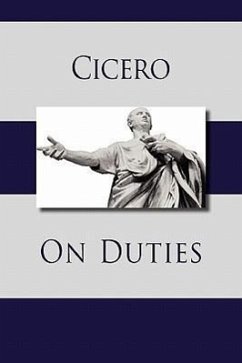On Duties was written in October-November of 44 B.C. during Cicero's last year at age sixty-two in an attempt to define the ideals of public behavior. Active in politics, the practical philosopher tried to prevent revolutionary forces from taking control of the Roman Republic. Despite his efforts, the republican system failed to revive even upon the assassination of Caesar, and Cicero was himself assassinated shortly thereafter. Fortunately, his writings on how citizens of a republic should live have survived in this remarkable book, with as much relevance now as it had 2,000 years ago. Written in the form of a letter to Cicero's son, On Duties expounds the philosopher's conception of the best way to live, behave, and observe moral obligations--something desperately needed in the midst of today's political turmoil.
Hinweis: Dieser Artikel kann nur an eine deutsche Lieferadresse ausgeliefert werden.
Hinweis: Dieser Artikel kann nur an eine deutsche Lieferadresse ausgeliefert werden.








